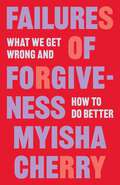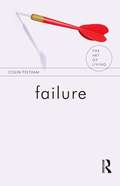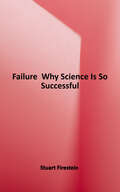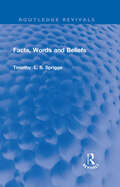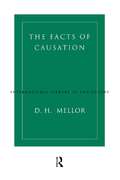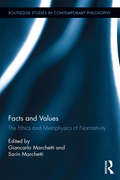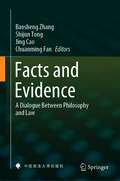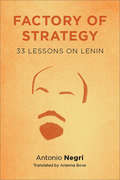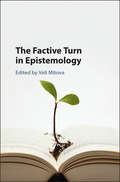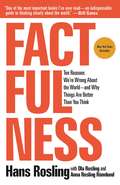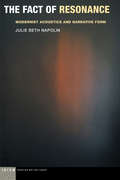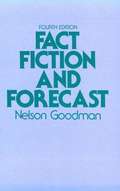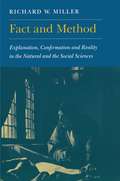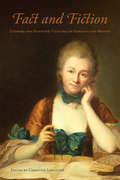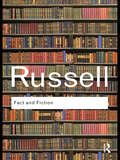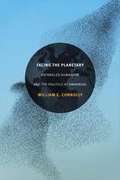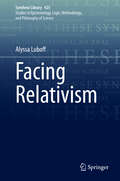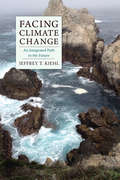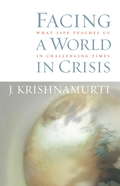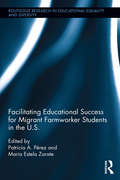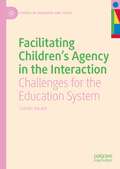- Table View
- List View
Failures of Forgiveness: What We Get Wrong and How to Do Better
by Myisha CherryPhilosopher Myisha Cherry teaches us the right ways to deal with wrongdoing in our lives and the worldSages from Cicero to Oprah have told us that forgiveness requires us to let go of negative emotions and that it has a unique power to heal our wounds. In Failures of Forgiveness, Myisha Cherry argues that these beliefs couldn’t be more wrong—and that the ways we think about and use forgiveness, personally and as a society, can often do more harm than good. She presents a new and healthier understanding of forgiveness—one that will give us a better chance to recover from wrongdoing and move toward “radical repair.”Cherry began exploring forgiveness after some relatives of the victims of the mass shooting at Emanuel A.M.E. Church in Charleston, South Carolina, forgave what seemed unforgiveable. She was troubled that many observers appeared to be more inspired by these acts of forgiveness than they were motivated to confront the racial hatred that led to the killings. That is a big mistake, Cherry argues. Forgiveness isn’t magic. We can forgive and still be angry, there can be good reasons not to forgive, and forgiving a wrong without tackling its roots solves nothing. Examining how forgiveness can go wrong in families, between friends, at work, and in the media, politics, and beyond, Cherry addresses forgiveness and race, canceling versus forgiving, self-forgiveness, and more. She takes the burden of forgiveness off those who have been wronged and offers guidance both to those deciding whether and how to forgive and those seeking forgiveness.By showing us how to do forgiveness better, Failures of Forgiveness promises to transform how we deal with wrongdoing in our lives, opening a new path to true healing and reconciliation.
Failure: Failure (The Art of Living)
by Colin FelthamFailure, success's ugly sister, is inevitable - cognitively, biologically and morally. We all make mistakes, we all die, and we all get it wrong. A chain of flaws can be traced through all phenomena, natural and human. We see impending and actual failures in individual lives, in marriages, careers, in religion, education, psychotherapy, business, nations, and in entire civilizations. And there are chronic and imperceptible failures in everyday domains that most of the time we barely notice, often until it is too late. Colin Feltham expores what constitutes failure across a number of domains. He takes guidance from the work of such diverse philosophers and thinkers as Diogenes, Epictetus, Augustine, Schopenhauer, Kierkegaard, Heidegger, Sartre, Camus, Cioran and Ricoeur, while also drawing on the insights of artists and writers such as van Gogh, Arthur Miller, Philip Larkin, Samuel Beckett, Charles Bukowski and Philip Roth. Precursors and partial synonyms for failure can be seen in the concepts of hamartia, sin, fallenness, non-being, false consciousness and anthropathology. Philosophy can help us but is itself, in its reliance on language and logic, subject to inherent flaws and failures. It is the very pervasiveness yet common denial of failure which makes it a compelling topic that cries out for honest analysis. We live in a time when the cliche of failed Marxism may be segueing frighteningly (for some) into the failure of 'selfish capitalism', in a time of geopolitical uncertainty and failure to address the dire need for agreement and action on climate change. But many of us are also painfully aware of our own shortcomings, our own weakness of will and lack of authenticity. Trying to identify where the lines may be drawn between individual responsibility, social policy, and historical and biological dark forces is a key challenge in this fascinating book.
Failure: Why Science is so Successful
by Stuart FiresteinThe general public has a glorified view of the pursuit of scientific research. However, the idealized perception of science as a rule-based, methodical system for accumulating facts could not be further from the truth. Modern science involves the idiosyncratic, often bumbling search for understanding in uncharted territories, full of wrong turns, false findings, and the occasional remarkable success. In his sequel to Ignorance (Oxford University Press, 2012), Stuart Firestein shows us that the scientific enterprise is riddled with mistakes and errors - and that this is a good thing! Failure: Why Science Is So Successful delves into the origins of scientific research as a process that relies upon trial and error, one which inevitably results in a hefty dose of failure. <p><p>Scientists throughout history have relied on failure to guide their research, viewing mistakes as a necessary part of the process. Citing both historical and contemporary examples, Firestein strips away the distorted view of science as infallible to provide the public with a rare, inside glimpse of the messy realities of the scientific process. An insider's view of how science is carried out, this book will delight anyone with an interest in science, from aspiring scientists to curious general readers. Accessible and entertaining, Failure illuminates the greatest and most productive adventure of human history, with all the missteps along the way.
Facts, Words and Beliefs (Routledge Revivals)
by Timothy L.S. SpriggeFirst published in 1970, Facts, Words and Beliefs is concerned primarily with formulating the following question and suggesting the right way of answering it- how can a few stray images or muttered words running through our mind constitute our envisagement of situation perhaps remote in time and place from our present position? From a practical point of view the moments when we envisage the nature of some situation which we believe to exist may not be of any great importance. It would seem that our belief in the existence of such situations lies in some sort of adjustment of our behaviour to them which will be useful if the situations really exist, from the point of view of survival and comfort. The author suggests that these moments of conscious envisagement of such absent situations may be rather a sign of such successful adjustment than a factor in bringing it about, hence of no practical value in themselves. However, if knowledge has any sort of intrinsic value, it must surely lie in those moments when one does consciously envisage some aspects of the world more or less as it really is, and to try to understand the nature of these moments is to try to understand all that is of intrinsic value in knowledge. This book is a must read for scholars and researchers of philosophy.
The Facts of Causation (International Library of Philosophy)
by D.H. MellorEverything we do relies on causation. We eat and drink because this causes us to stay alive. Courts tell us who causes crimes, criminology tell us what causes people to commit them. D.H. Mellor shows us that to understand the world and our lives we must understand causation.The Facts of Causation, now available in paperback, is essential reading for students and for anyone interested in reading one of the ground-breaking theories in metaphysics. We cannot understand the world and our place in it without understanding causation. Yet a complete account of the nature and implications of causation does not exist. D.H Mellor's new book is that account.
Facts and Values: The Ethics and Metaphysics of Normativity (Routledge Studies in Contemporary Philosophy)
by Giancarlo Marchetti Sarin MarchettiThis collection offers a synoptic view of current philosophical debates concerning the relationship between facts and values, bringing together a wide spectrum of contributors committed to testing the validity of this dichotomy, exploring alternatives, and assessing their implications. The assumption that facts and values inhabit distinct, unbridgeable conceptual and experiential domains has long dominated scientific and philosophical discourse, but this separation has been seriously called into question from a number of corners. The original essays here collected offer a diversity of responses to fact-value dichotomy, including contributions from Hilary Putnam and Ruth Anna Putnam who are rightly credited with revitalizing philosophical interest in this alleged opposition. Both they, and many of our contributors, are in agreement that the relationship between epistemic developments and evaluative attitudes cannot be framed as a conflict between descriptive and normative understanding. Each chapter demonstrates how and why contrapositions between science and ethics, between facts and values, and between objective and subjective are false dichotomies. Values cannot simply be separated from reason. Facts and Values will therefore prove essential reading for analytic and continental philosophers alike, for theorists of ethics and meta-ethics, and for philosophers of economics and law.
Facts and Evidence: A Dialogue Between Philosophy and Law
by Baosheng Zhang Shijun Tong Jing Cao Chuanming FanThis book presents an in-depth discussion on two concepts from the field of philosophy and law, in order to improve our understanding of the relation between “fact” and “evidence” in judicial process. Since fact-finding is a difficult task for judges, proof by evidence has been devised to help them access the truth. However, in the process of judicial fact-finding, there is always a gap between fact and truth. This book covers a wide range of topics, from reflections on the concept of “fact,” “evidence” and “fact-finding” in the field of philosophy and law to individual case studies. As such it is a useful reference resource on the continuing research on the judicial proof process for students and scholars.
Factory of Strategy: Thirty-Three Lessons on Lenin (Insurrections: Critical Studies in Religion, Politics, and Culture)
by Antonio NegriFactory of Strategy is the last of Antonio Negri's major political works to be translated into English. Rigorous and accessible, it is both a systematic inquiry into the development of Lenin's thought and an encapsulation of a critical shift in Negri's theoretical trajectory.Lenin is the only prominent politician of the modern era to seriously question the "withering away" and "extinction" of the state, and like Marx, he recognized the link between capitalism and modern sovereignty and the need to destroy capitalism and reconfigure the state. Negri refrains from portraying Lenin as a ferocious dictator enforcing the proletariat's reappropriation of wealth, nor does he depict him as a mere military tool of a vanguard opposed to the Ancien Régime. Negri instead champions Leninism's ability to adapt to different working-class configurations in Russia, China, Latin America, and elsewhere. He argues that Lenin developed a new political figuration in and beyond modernity and an effective organization capable of absorbing different historical conditions. He ultimately urges readers to recognize the universal application of Leninism today and its potential to institutionally—not anarchically—dismantle centralized power.
Factory of Strategy
by Antonio Negri Arianna BoveFactory of Strategy is the last of Antonio Negri's major political works to be translated into English. Rigorous and accessible, it is both a systematic inquiry into the development of Lenin's thought and an encapsulation of a critical shift in Negri's theoretical trajectory.Lenin is the only prominent politician of the modern era to seriously question the "withering away" and "extinction" of the state, and like Marx, he recognized the link between capitalism and modern sovereignty and the need to destroy capitalism and reconfigure the state. Negri refrains from portraying Lenin as a ferocious dictator enforcing the poor's reappropriation of wealth, nor does he depict him as a mere military tool of a vanguard opposed to the ancien régime. Negri instead champions Leninism's ability to adapt to different working-class compositions in Russia, China, Latin America, and elsewhere. He argues that Lenin developed a new political figure in and beyond modernity and an effective organization capable of absorbing different historical conditions. Negri ultimately urges readers to recognize the universal application of Leninism today and its potential to institutionally -- not anarchically -- dismantle centralized power.
The Factive Turn in Epistemology
by Veli MitovaWhen you believe something for a good reason, your belief is in a position to be justified, rational, responsible, or to count as knowledge. But what is the nature of this thing that can make such a difference? Traditionally, epistemologists thought of epistemic normative notions, such as reasons, in terms of the believer's psychological perspective. Recently, however, many have started thinking of them as factive: good reasons for belief are either facts, veridical experiences, or known propositions. This ground breaking volume reflects major recent developments in thinking about this 'factive turn', and advances the lively debate around it in relation to core epistemological themes including perception, evidence, justification, knowledge, scepticism, rationality, and action. With clear and comprehensive chapters written by leading figures in the field, this book will be essential for students and scholars looking to engage with the state of the art in epistemology.
Factfulness: Ten Reasons We're Wrong About The World--and Why Things Are Better Than You Think
by Hans Rosling Ola Rosling Anna Rosling Rönnlund<P>Factfulness: The stress-reducing habit of only carrying opinions for which you have strong supporting facts. <P>When asked simple questions about global trends—what percentage of the world’s population live in poverty; why the world’s population is increasing; how many girls finish school—we systematically get the answers wrong. So wrong that a chimpanzee choosing answers at random will consistently outguess teachers, journalists, Nobel laureates, and investment bankers. <P>In Factfulness, Professor of International Health and global TED phenomenon Hans Rosling, together with his two long-time collaborators, Anna and Ola, offers a radical new explanation of why this happens. They reveal the ten instincts that distort our perspective—from our tendency to divide the world into two camps (usually some version of us and them) to the way we consume media (where fear rules) to how we perceive progress (believing that most things are getting worse).
The Fact of Resonance: Modernist Acoustics and Narrative Form (Idiom: Inventing Writing Theory)
by Julie Beth NapolinThe Fact of Resonance returns to the colonial and technological contexts in which theories of the novel developed, seeking in sound an alternative premise for theorizing modernist narrative form. Arguing that narrative theory has been founded on an exclusion of sound, the book poses a missing counterpart to modernism’s question “who speaks?” in the hidden acoustical questions “who hears?” and “who listens?”For Napolin, the experience of reading is undergirded by the sonic. The book captures and enhances literature’s ambient sounds, sounds that are clues to heterogeneous experiences secreted within the acoustical unconscious of texts. The book invents an oblique ear, a subtle and lyrical prose style attuned to picking up sounds no longer hearable. “Resonance” opens upon a new genealogy of modernism, tracking from Joseph Conrad to his interlocutors—Sigmund Freud, Frantz Fanon, W. E. B. Du Bois, William Faulkner, and Chantal Akerman—the racialized, gendered, and colonial implications of acoustical figures that “drift” through and are transformed by narrative worlds in writing, film, and music.A major synthesis of resources gleaned from across the theoretical humanities, the book argues for “resonance” as the traversal of acoustical figures across the spaces of colonial and technological modernity, figures registering and transmitting transformations of “voice” and “sound” across languages, culture, and modalities of hearing. We have not yet sufficiently attended to relays between sound, narrative, and the unconscious that are crucial to the ideological entailments and figural strategies of transnational, transatlantic, and transpacific modernism. The breadth of the book’s engagements will make it of interest not only to students and scholars of modernist fiction and sound studies, but to anyone interested in contemporary critical theory.
Fact, Fiction, and Forecast
by Nelson GoodmanHere, in a new edition, is Nelson Goodman’s provocative philosophical classic―a book that, according to Science, “raised a storm of controversy” when it was first published in 1954, and one that remains on the front lines of philosophical debate. <p><p> How is it that we feel confident in generalizing from experience in some ways but not in others? How are generalizations that are warranted to be distinguished from those that are not? Goodman shows that these questions resist formal solution and his demonstration has been taken by nativists like Chomsky and Fodor as proof that neither scientific induction nor ordinary learning can proceed without an a priori, or innate, ordering of hypotheses. <p> In his new foreword to this edition, Hilary Putnam forcefully rejects these nativist claims. The controversy surrounding these unsolved problems is as relevant to the psychology of cognitive development as it is to the philosophy of science. No serious student of either discipline can afford to misunderstand Goodman’s classic argument.
Fact and Method: Explanation, Confirmation and Reality in the Natural and the Social Sciences
by Richard W. MillerIn this bold work, of broad scope and rich erudition, Richard Miller sets out to reorient the philosophy of science. By questioning both positivism and its leading critics, he develops new solutions to the most urgent problems about justification, explanation, and truth. Using a wealth of examples from both the natural and the social sciences, Fact and Method applies the new account of scientific reason to specific questions of method in virtually every field of inquiry, including biology, physics, history, sociology, anthropology, economics, psychology, and literary theory. Explicit and up-to-date analysis of leading alternative views and a wealth of examples make it an ideal introduction to the philosophy of science, as well as a powerful attempt to change the field. Like the works of Hempel, Reichenbach, and Nagel in an earlier generation, it will challenge, instruct, and help anyone with an interest in science and its limits.For the past quarter-century, the philosophy of science has been in a crisis brought on by the failure of the positivist project of resolving all basic methodological questions by applying absolutely general rules, valid for all fields at all times. Professor Miller presents a new view in which what counts as an explanation, a cause, a confirming test, or a compelling case for the existence of an unobservable is determined by frameworks of specific substantive principles, rationally adopted in the light of the actual history of inquiry. While the history of science has usually been the material for relativism, Professor Miller uses arguments of Darwin, Newton, Einstein, Galileo, and others both to undermine positivist conceptions of rationality and to support the positivists' optimism that important theoretical findings are often justifiable from all reasonable perspectives.
Fact and Fiction: Literary and Scientific Cultures in Germany and Britain
by Christine LehleiterFact and Fiction explores the intersection between literature and the sciences, focusing on German and British culture between the eighteenth century and today. Observing that it was in the eighteenth century that the divide between science and literature as disciplines first began to be defined, the contributors to this collection probe how authors from that time onwards have assessed and affected the relationship between literary and scientific cultures.Fact and Fiction's twelve essays cover a wide range of scientific disciplines, from physics and chemistry to medicine and anthropology, and a variety of literary texts, such as Erasmus Darwin's poem The Botanic Garden, George Eliot's Daniel Deronda, and Goethe's Elective Affinities. The collection will appeal to scholars of literature and of the history of science, and to those interested in the connections between the two.
Fact and Fiction
by Bertrand RussellFirst published in 1961, Fact and Fiction is a collection of Bertrand Russell’s essays that reflect on the books and writings that influenced his life, including fiction, essays on politics and education, divertissements and parables. Also broaching on the highly controversial issues of war and peace, it is in this classic collection that Russell states some of his most famous pronouncements on nuclear warfare and international relations. It is a remarkable book that provides valuable insight into the range of interests and depth of convictions of one of the world’s greatest philosophers.
Fackenheim's Jewish Philosophy
by Michael L. MorganEmil L. Fackenheim, one of the most significant Jewish thinkers of the twentieth century, is best known for his deep and rich engagement with the implications of the Nazi Holocaust on Jewish thought, Christian theology, and philosophy. However, his career as a philosopher and theologian began two decades prior to his first efforts to confront that horrific event. In this book, renowned Fackenheim expert Michael L. Morgan offers the first examination of the full scope of Fackenheim's 60-year career, beyond simply his work on the Holocaust.Fackenheim's Jewish Philosophy explores the most important themes of Fackenheim's philosophical and religious thought and how these remained central, if not always in immutable ways, over his entire career. Morgan also provides insight into Fackenheim's indebtedness to Kant, Hegel, and rabbinic midrash, as well as the changing character of his philosophical "voice." The work concludes with a chapter evaluating Fackenheim's legacy for present and future Jewish philosophy and philosophy more generally.
Facing the Planetary: Entangled Humanism and the Politics of Swarming
by William E. ConnollyIn Facing the Planetary William E. Connolly expands his influential work on the politics of pluralization, capitalism, fragility, and secularism to address the complexities of climate change and to complicate notions of the Anthropocene. Focusing on planetary processes—including the ocean conveyor, glacier flows, tectonic plates, and species evolution—he combines a critical understanding of capitalism with an appreciation of how such nonhuman systems periodically change on their own. Drawing upon scientists and intellectuals such as Lynn Margulis, Michael Benton, Alfred North Whitehead, Anna Tsing, Mahatma Gandhi, Wangari Maathai, Pope Francis, Bruno Latour, and Naomi Klein, Connolly focuses on the gap between those regions creating the most climate change and those suffering most from it. He addresses the creative potential of a "politics of swarming" by which people in different regions and social positions coalesce to reshape dominant priorities. He also explores how those displaying spiritual affinities across differences in creed can energize a militant assemblage that is already underway.
Facing Relativism (Synthese Library #425)
by Alyssa LuboffThis book tackles the difficult task of defending relativism in the age of science. It succeeds where others have failed by combining the rigor of analytic philosophy with the first-hand insights of anthropological experience. Typically, an anthropologist’s work on relativism offers rich examples of cultural diversity, but lacks philosophical rigor, while a philosopher’s work on relativism offers rigorous argumentation, but lacks rich anthropological examples. Facing Relativism, written by a North American philosopher who lived in the Ecuadorian rainforest, does both.Relativism at a global scale is a view that our claims about the world, both theoretical and practical, are evaluable only relative to a context shaped by factors such as culture, history, language, and environment – or, “a way of life.” It can be at once intuitive and disturbing. While we might expect a way of life to exert some influence on our claims, relativism seems to move to the overly strong conclusion that all of our claims about what is true or good must merely be expressions of cultural bias. It easily opens itself to a host of charges, including paradox and self-contradiction.Facing Relativism argues that such problems arise largely from a failure to situate the view within the context that has, throughout its long history, been its inspiration: the experience – whether through literature, the imagination, or direct anthropological contact – of deeply engaging with a very different way of life. By starting with a careful analysis of the experience of deep engagement, this book shows that relativism is neither as incoherent nor as alarming as we tend to think. In fact, it might just offer the tools we need to face these times of global crisis and change.Alyssa Luboff has produced an exceptional defense of a cultural relativism that recognizes how the epistemic and the ethical intertwine in a way of life. Drawing from her deep engagement over many years with the Chachi and traditional Afro-Ecuadorian people, she provides vivid and compelling examples of how one can come to understand another way of life as well-reasoned, coherent, and integrated, as challenging to one’s own commitments at the same time that one challenges it. Luboff combines her deep engagement with command of the relevant philosophical and anthropological literature. She presents the major arguments against relativism in a sympathetic and generous way, and carefully responds with a sophisticated relativism that acknowledges how the world resists and responds to different conceptual shapings of it. This book is beautifully written and will engage both the academic specialist and the intelligent general reader. – David Wong, Duke UniversityBy the time her brilliant faceoff is over, philosophical relativism will never again be seen as a straw man. – Richard A. Shweder, University of ChicagoThis book will interest readers who seek an astute account of how the pursuit of “truth” – whether relative or absolute – enters into practices of power. Luboff ’s treatment is impressive. – Michael Krausz, Bryn Mawr College and Linacre College, Oxford University
Facing Evil
by John KekesJohn Kekes demonstrates that the prevalence of evil presents a fundamental problem for our secular sensibility and develops the theory of character-morality as a response. He believes that the main sources of evil are produced by our character defects and through unchosen ations and that we can increase our control over the evil we cause.
Facing Evil
by John KekesArguing that the prevalence of evil presents a fundamental problem for our secular sensibility, John Kekes develops a conception of character-morality as a response. He shows that the main sources of evil are habitual, unchosen actions produced by our character defects and that we can increase our control over the evil we cause by cultivating a reflective temper.
Facing Climate Change: An Integrated Path to the Future
by Jeffrey KiehlFacing Climate Change explains why people refuse to accept evidence of a warming planet and shows how to move past partisanship to reach a consensus for action. A climate scientist and licensed Jungian analyst, Jeffrey T. Kiehl examines the psychological phenomena that twist our relationship to the natural world and their role in shaping the cultural beliefs that distance us further from nature. He also accounts for the emotions triggered by the lived experience of climate change and the feelings of fear and loss they inspire, which lead us to deny the reality of our warming planet.But it is not too late. By evaluating our way of being, Kiehl unleashes a potential human emotional understanding that can reform our behavior and help protect the Earth. Kiehl dives deep into the human brain's psychological structures and human spirituality's imaginative power, mining promising resources for creating a healthier connection to the environment—and one another. Facing Climate Change is as concerned with repairing our social and political fractures as it is with reestablishing our ties to the world, teaching us to push past partisanship and unite around the shared attributes that are key to our survival. Kiehl encourages policy makers and activists to appeal to our interdependence as a global society, extracting politics from the process and making decisions about our climate future that are substantial and sustaining.
Facing a World in Crisis: What Life Teaches Us in Challenging Times
by Jiddu KrishnamurtiJ. Krishnamurti, one of the most beloved and renowned religious teachers of the twentieth century, often taught his students that they must look at the state of the world, with all its violence and conflict, if they are ever to understand themselves. To turn away from world events was for him not to be alive to what life has to teach. Facing a World in Crisis presents a selection of talks that Krishnamurti gave on how to live in and respond to troubling and uncertain times. His message of personal responsibility and the importance of connecting with the broader world is presented in a nonsectarian and nonpolitical way. Direct and ultimately life-affirming, Facing a World in Crisis will resonate with readers today who are looking for a new way to understand and find hope in challenging times.
Facilitating Educational Success For Migrant Farmworker Students in the U.S. (Routledge Research in Educational Equality and Diversity)
by Patricia Perez Maria Estela ZarateGrounded in empirical research, this timely volume examines the challenges to academic success that migrant farmworker students face in the U.S. Providing an original framework for academic success among migrant farmworker students and applying a diverse range of methodological approaches, chapter authors address a range of topics, including English Language Learner development; support for educators who work with migrant farmworker students; promotion of migrant family involvement; and college access. This book provides pragmatic strategies and interventions and considers practical and policy implications to increase migrant student academic achievement and support migrant farmworker students and families.
Facilitating Children's Agency in the Interaction: Challenges for the Education System (Studies in Childhood and Youth)
by Claudio BaraldiThis book analyzes children's agency as interactional achievement in formal and informal contexts of education and illuminates how agency can be encouraged and supported in these educational contexts. Taking a sociological approach, the author deals with children as social agents rather than learners and considers structures of interaction which encourage and support agency, rather than teaching. The book draws from field research conducted over more than twenty years in a variety of Italian and international contexts. This book is unique in providing a theoretical reflection on the social structures that can support children’s agency, as well as a large amount of examples which show how these structures and agency work.
